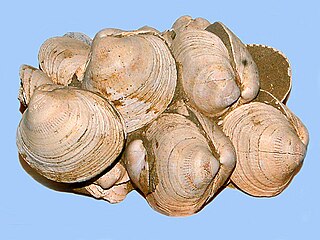
Ancyloceras is an extinct genus of heteromorph ammonites found throughout the world during the Lower Cretaceous, from the Lower Barremian epoch until the genus extinction during the Lower Aptian.

Nipponites is an extinct genus of heteromorph ammonites. The shells of Nipponites form "ox-bow" bends, resulting in some of the most bizarre shapes seen among ammonites.

Cimolichthys is an extinct genus of 1.5- to 2.0-meter-long nektonic predatory aulopiformid fish.

Phylloceras is an extinct genus of ammonoid cephalopods belonging to the family Phylloceratidae. These nektonic carnivores lived from Early Jurassic to Late Cretaceous.

Pachydesmoceras is a genus of ammonites belonging to the family Desmoceratidae.

Glycymeris, common name the bittersweet clams, is a genus of saltwater clams, marine bivalve molluscs in the family Glycymerididae.

Pterotrigonia is an extinct genus of saltwater clams, marine bivalve molluscs in the family Megatrigoniidae. This genus is known in the fossil record from the Jurassic period Tithonian age to the Cretaceous period Maastrichtian age. Species in this genus were facultatively mobile infaunal suspension feeders. The type species of the genus is Pterotrigonia cristata.

Phyllopachyceras is an extinct genus of ammonoid cephalopods belonging to the family Phylloceratidae. These nektonic carnivores lived in the Cretaceous, from Hauterivian to Maastrichtian to age.

Protetragonites is an extinct genus of ammonoid cephalopods belonging to the family Lytoceratidae. These fast-moving nektonic carnivores lived from the Jurassic period Tithonian age to the Cretaceous period Aptian age.

Eulytoceras is an extinct genus of ammonoid cephalopods belonging to the family Lytoceratidae. These fast-moving nektonic carnivores lived in the Cretaceous period, from Hauterivian age to Barremian age.

Pseudothurmannia is a genus of extinct cephalopods belonging to the subclass Ammonoidea and included in the family Crioceratitidae of the ammonitid superfamily Ancylocerataceae. These fast-moving nektonic carnivores lived in the Cretaceous period, from Hauterivian age to Barremian age.

Hemihoplites is an extinct genus of ammonoid cephalopods belonging to the family Hemihoplitidae. These fast-moving nektonic carnivores lived in the Cretaceous period, from Hauterivian age to Barremian age.

Kossmaticeras is an extinct ammonoid genus belonging to the desmoceratacean family Kossmaticeratidae. Species in this genus were fast-moving nektonic carnivores. They lived during the Late Cretaceous, from upper Turonian to upper Maastrichtian age. The type species of the genus is Ammonites theobaldianus.

Silesites is an ammonite genus placed in the family Silesitidae. Species in this genus were fast-moving nektonic carnivores. They lived during the Cretaceous, in the Barremian age. The type species of the genus is Silesites seranonis .

Heinzia is an extinct ammonoid cephalopod genus belonging to the family Pulchelliidae. They lived during the Cretaceous, in the Barremian age.

Dufrenoyia is an extinct genus of Cretaceous ammonites included in the family Parahoplitidae. These fast-moving nektonic carnivores lived in the Cretaceous period. The type species of the genus is Ammonites dufrenoyi.

Sonneratia is an extinct genus of Cretaceous ammonites included in the family Hoplitidae. These fast-moving nektonic carnivores lived in the Cretaceous period, Aptian - Albian age.

Oosterella is an extinct ammonoid cephalopod genus belonging to the family Oosterellidae. These fast-moving nektonic carnivores lived during the Cretaceous, from the upper Valanginian age to the lower Hauterivian age.

Eotetragonites is an extinct genus of ammonite.

Pygurus is a genus of sea urchins belonging to the family Clypeidae.




















